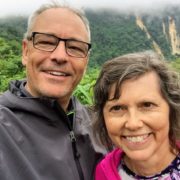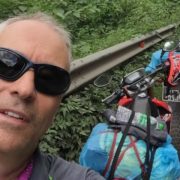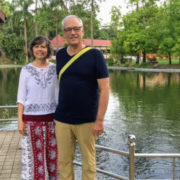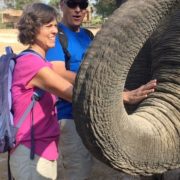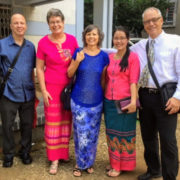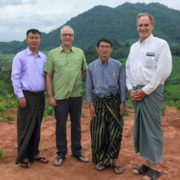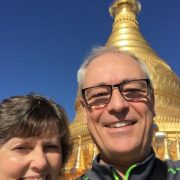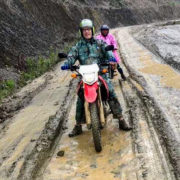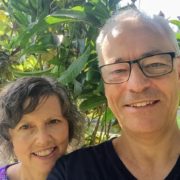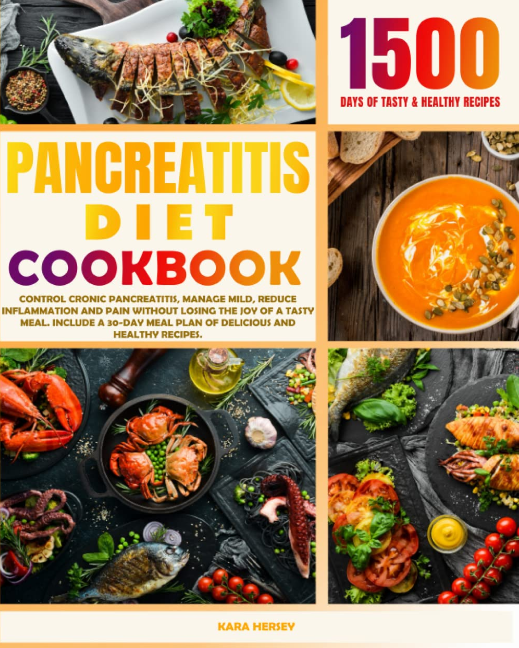
Dan Winkelman’s Global Journey of Faith, Hope & Healing
Contributing Writer
Julia Brabant
March 2021
Diagnosed: August 2018
Current Status: No Sign of Cancer Since March 2019
Dan Winkelman’s faith brought him to some of the furthest regions of the globe, but it wasn’t until he was back on U.S. soil that he learned just how far his faith could truly take him.
Dan, a pastor-turned-missionary from Stevens Point, Wisconsin, moved to the Southeast Asian nation of Myanmar (formerly known as Burma) in 2015 alongside his wife, Sandy. There, he spearheaded church-planting efforts in the primarily Buddhist region and offered leadership training for community members with interests in business, religion and other areas.
One day, while on a nine-hour motorcycle ride with a coworker up the Burma Road, the main thoroughfare between Myanmar and southwest China, Dan’s front wheel struck a pothole. Unmaintained and essentially lawless roadways were among the many hazards associated with traveling in this region, where internal conflicts and ongoing political unrest have led to the longest civil war in world history.
Potholes, at the time, were among the least of Dan’s concerns, but he felt he may have tweaked his back in the accident and felt pain developing along the left side of his spine. When the pain didn’t subside, he made plans to visit the hospital in Yangon, Myanmar’s largest city. He was supposed to travel to Bangkok, Thailand, in a few days, and he didn’t want the injury to delay or sideline them.
The hospital in Yangon proved to be little more than a doctor and an X-ray machine. There, the physician assessed Dan’s condition, diagnosed him with a sprained muscle, gave him some pain pills and sent him on his way. He then made the trip to Thailand, but once there, the pain worsened, so he visited an international hospital in Bangkok for a second opinion.
The doctor in Bangkok, too, diagnosed him with a muscle sprain, and so, too, did two additional doctors before he returned to Myanmar. All of them recommended treatment methods, and when none of them worked, Dan went back to the hospital for a CT scan.
“The doctor there said, ‘You have a tumor on your pancreas,’” Dan said. A biopsy soon revealed that the tumor was pancreatic cancer. “My wife and I were devastated – we were completely alone and a world away,” he said. “Here I was, at the peak of my success with the mission, and I get a diagnosis of pancreatic cancer.”
Dan said, together, he and his wife prayed and cried. “Everyone looks for a miracle in this kind of situation, and we did too.”
That “miracle” came moments later, when, suddenly, he felt an inexplicable feeling of calm overcome him. “For a minute, I felt this peaceful presence, and my anguish completely left.”
Dan describes then hearing a message he says he’ll never forget. “Dan, remember how many times I’ve rescued you in the past? I’ll rescue you again.”
He knew then that it was God speaking to him. And while he understands that “God” means many different things to many different people, it was in that moment, however fleeting, that he felt an unexplainable feeling of confidence that everything would be OK.
A Helping Hand From a Higher Power
Dan’s confidence was rooted in the fact that he had, in fact, faced adversity many times before – and managed to overcome it. He recalled one story of a transformative event that occurred when he was 7 or 8 and out on a friend’s boat alongside the friend’s father and sister.
The boat flipped while traveling at a high speed, trapping the young Dan underneath when his life vest got stuck to something inside the flipped boat. After struggling to free himself, he started to accept that he’d die, feeling at peace when he remembered his mother’s words.
“God is in heaven,” she’s always said, “…and heaven is our home.” With that, he accepted his fate and breathed the water into his lungs. The next thing he remembered was an arm wrapping around him and wrenching him away from the life jacket and the underside of the boat. Then, the arm tossed him on the floor of a different boat, where he continued to come to.
It wasn’t until about 30 years later that he saw the family again and seized the opportunity to thank his friend’s dad, Jack, for saving his life that day. “What do you mean?” Jack had replied. “I saved my own two children. I didn’t save you.”
Who, exactly, saved Dan from the boat that day is not clear. What WAS clear, though, was that someone – or something – had been looking out for him that day, and whoever – or whatever – it was would do so many more times before the end of Dan’s days.
Post-Diagnosis
After Dan’s diagnosis in Myanmar, his son, who had a background in nutraceuticals and other types of preventive medicine, and his daughter went straight to work researching the best pancreatic cancer programs and physicians back in the United States.
His son came across Dr. Douglas B. Evans, MD, FACS, at the Froedtert & Medical College of Wisconsin, and the doctor agreed to see Dan within a matter of days. He did so even though Dan’s overseas diagnosis had led to the delay of him getting his medical records, X-rays, and other patient information from Asia, which had been a deal-breaker for other hospitals where he’d sought treatment.
After more scans, Dan received a Stage 3 pancreatic cancer diagnosis. To complicate matters further, the tumor was also wrapped around some of his nerves and arteries. Dr. Evans recommended he begin chemotherapy treatments back in Stevens Point using FOLFIRINOX in August of 2018, which is a combination of cancer drugs used to treat advanced pancreatic cancer.
When FOLFIRINOX failed to produce positive results and left Dan feeling even worse, he began undergoing chemotherapy using a different drug, Gemcitabine. The results with Gemcitabine were markedly different, and the cancer responded rapidly, with his cancer counts eventually falling back within the normal range. Dan’s chemotherapy treatments were so successful, in fact, that they led to significant breakthroughs in terms of how Dr. Evans and his team used certain forms of chemotherapy to target the specific types of cancer cells found in a patient’s tumor moving forward.
Dan did feel some fatigue and other minor issues while undergoing the new chemotherapy, but overall, the side effects were tolerable. After several months of successful chemotherapy, his doctor recommended radiation and asked Dan if he’d like to try to take part in a clinical trial.
A New Dawn
Dan entered a lottery with the hope of participating in a clinical trial that would see patients receive high doses of radiation over a short amount of time, rather than small doses of radiation over an extended period. His name was pulled during the lottery, so he moved forward with the exploratory treatment. By March of 2019, Dan received word that his tumor had shrunk enough for surgery. His medical team decided he should undergo the Appleby Procedure, which is also known as a distal pancreatectomy with celiac artery carcinoma.
In addition to removing about two-thirds of his pancreas, the surgery involved the removal of some of the veins in Dan’s leg. Dr. Evans, who is a vascular surgeon in addition to a pancreatic cancer specialist, performed the procedure.
“He’s a hero,” Dan said of Dr. Evans. “Not just him, but his entire staff. They’re not just people with superb skill – but people with empathy. He told me, ‘Dan – you’re going to make it. You’ve got the big guy on your side.’”
Make it, Dan did. The procedure was successful, though the recovery period was a long and arduous one earmarked by infections, other complications and an extended hospital stay. After checking out of the hospital, Dan’s condition continued to improve, though he still experiences occasional digestive issues.
These days, Dan takes Zarelto, a blood thinner, and pancreatic enzymes, and he sees the doctor every four months for follow-up scans and reviews. His doctors had told him that he’d likely have to live with diabetes, too, for the remainder of his life, but it was a pleasant surprise when this ended up not being the case.
“I’m not just barely living – I’m living a full, happy life,” Dan said, noting that he gardens, enjoys time outside and spends time with his family, including his three adult children and six grandkids. He also credits his extended church family for their continued prayers, his own family with keeping his spirits high, and his children for going above and beyond in terms of researching doctors and options for when he returned to the United States from overseas.
“They really did all the legwork,” he said, noting that his son proved instrumental in researching methods of improving gut health and recommending high-powered probiotics and high-potency Vitamin D to aid Dan’s recovery.
Dan also underwent genetic testing following his diagnosis to see if he had any predispositions to pancreatic cancer, although the tests did not indicate any such predisposition.
Continued Blessings
While Dan continued treatment, he and his wife soon received notice that his insurance company had denied his upcoming surgery. If it weren’t for the monumental efforts of Gabriella Pyttiuk, one of Dr. Evan’s staff members, Dan would wind up continuing to pay these bills for the rest of his life.
Instead, “Gabby” went to bat for the family, sending documentation to the insurance company and refusing to take no for an answer. Ultimately, her efforts paid off, and the insurance company agreed to cover Dan’s expenses.
“I can’t tell you what that meant to us,” Dan said. “We would have been financially devastated.”
Now, Dan has begun sharing his own story, both with other pancreatic cancer patients and with students at a high school near his home in Wisconsin.
“When I talk to patients, I always tell them, ‘Get a second opinion,’” he said. “’ Advocate for yourself, and find a place where you fit in.”
It frightens him to think about what the outcome may have been, had he not found his way to Froedtert and Dr. Evans. He also tells new patients to find their own source of hope and healing, whether spiritual or otherwise.
“There’s a very real power in hope – it’s a very powerful thing to carry you through troubled times,” he said, noting that, while he found his own strength through God, others may find theirs through nature or similar sources. “Healing and hope are connected. You need hope to win the psychological war against pancreatic cancer. Because of hope and faith, I beat the odds.”
Dan Winkelman has shown no signs of active cancer since March 2019.

